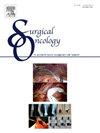新辅助化放疗与延长磁共振成像检测到硬膜外血管侵犯(mrEMVI)阳性直肠癌患者的无复发生存期有关:日本一项多中心回顾性队列研究
IF 2.4
4区 医学
Q3 ONCOLOGY
引用次数: 0
摘要
目的 新辅助化放疗(nCRT)可用于局部晚期直肠癌的局部控制,但其对预后的影响有限,而且经常会损害盆腔器官功能。因此,谨慎选择患者至关重要。本研究旨在根据磁共振成像检测到的周缘切除缘(mrCRM)或硬膜外血管侵犯(mrEMVI)对患者进行分层,以研究nCRT对无复发生存率(RFS)的影响,因为磁共振成像结果能否确定患者将从nCRT中获益尚不确定。方法我们回顾性分析了2010年至2011年期间在日本69家医院接受手术切除并接受或不接受nCRT的临床II-III期下段直肠癌患者。结果在整个队列(nCRT,n = 172;单纯手术,n = 503)中,nCRT 有改善 RFS 的趋势,但差异无统计学意义(HR,0.74;95 % CI,0.54-1.03;P = 0.074)。在 mrCRM 阴性和 mrEMVI 阴性患者中,nCRT 组和单纯手术组的 RFS 无明显差异。在 mrCRM 阳性患者中,nCRT 有改善 RFS 的趋势(HR,0.70;95 % CI,0.46-1.06;P = 0.089)。在mrEMVI阳性患者中,nCRT明显延长了RFS(HR,0.62;95 % CI,0.38-1.00;P = 0.048)。结论与单纯手术相比,nCRT不能明显改善总体人群的RFS,但能明显改善mrEMVI阳性患者的RFS。本文章由计算机程序翻译,如有差异,请以英文原文为准。
Neoadjuvant chemoradiotherapy is associated with prolonged relapse free survival in patient with MRI-detected extramural vascular invasion (mrEMVI) positive rectal cancer: A multicenter retrospective cohort study in Japan
Purpose
Neoadjuvant chemoradiotherapy (nCRT) is employed for the local control of locally advanced rectal cancer; however, its prognostic impact is limited and often impairs pelvic organ function. Therefore, careful patient selection is essential. This study aimed to investigate the impact of nCRT on relapse-free survival (RFS) by stratifying patients according to MRI detected circumferential resection margin (mrCRM) or extramural vascular invasion (mrEMVI), as the ability of MRI findings to identify patients who will have beneficial outcomes from nCRT is uncertain.
Methods
We retrospectively analyzed patients with clinical stage II–III lower rectal cancer who underwent surgical resection with or without nCRT between 2010 and 2011 at 69 hospitals in Japan. The impact of nCRT on RFS was evaluated using multivariable Cox regression models in the entire cohort and in subgroups stratified by mrCRM or mrEMVI status.
Results
In the entire cohort (nCRT, n = 172; surgery alone, n = 503), nCRT showed a trend toward improved RFS, although the difference was not statistically significant (HR, 0.74; 95 % CI, 0.54–1.03; P = 0.074). Among mrCRM-negative and mrEMVI-negative patients, there were no significant differences in RFS between the nCRT and surgery-alone groups. Among mrCRM-positive patients, nCRT tended to improve the RFS (HR, 0.70; 95 % CI, 0.46–1.06; P = 0.089). Among mrEMVI-positive patients, nCRT significantly prolonged the RFS (HR, 0.62; 95 % CI, 0.38–1.00; P = 0.048).
Conclusions
Compared to surgery alone, nCRT did not significantly improve RFS in the overall population but significantly improved RFS in mrEMVI-positive patients.
求助全文
通过发布文献求助,成功后即可免费获取论文全文。
去求助
来源期刊

Surgical Oncology-Oxford
医学-外科
CiteScore
4.50
自引率
0.00%
发文量
169
审稿时长
38 days
期刊介绍:
Surgical Oncology is a peer reviewed journal publishing review articles that contribute to the advancement of knowledge in surgical oncology and related fields of interest. Articles represent a spectrum of current technology in oncology research as well as those concerning clinical trials, surgical technique, methods of investigation and patient evaluation. Surgical Oncology publishes comprehensive Reviews that examine individual topics in considerable detail, in addition to editorials and commentaries which focus on selected papers. The journal also publishes special issues which explore topics of interest to surgical oncologists in great detail - outlining recent advancements and providing readers with the most up to date information.
 求助内容:
求助内容: 应助结果提醒方式:
应助结果提醒方式:


